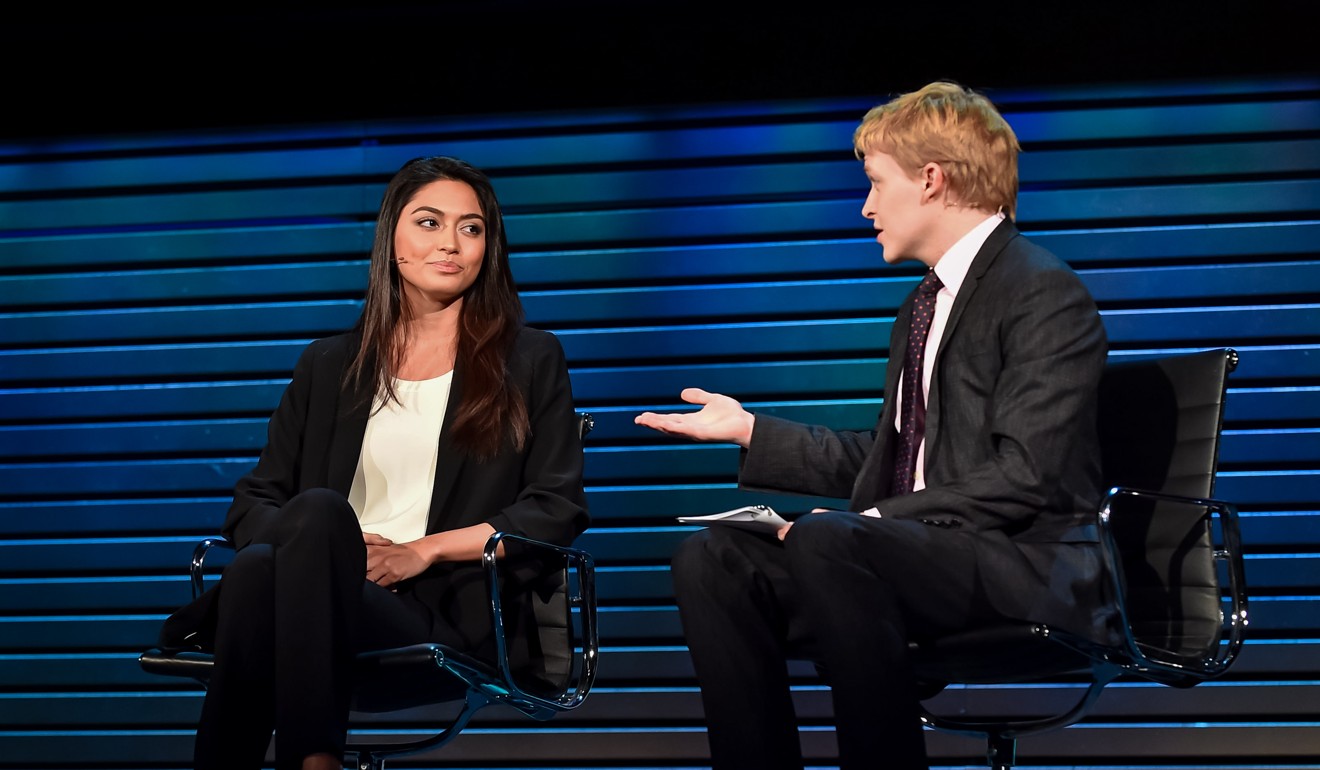
Ambra Battilana Gutierrez, Harvey Weinstein accuser, on her Philippine #MeToo campaign
- Model moved to Philippines amid a backlash over her sexual misconduct claim, and admits it’s a hard place to promote female empowerment
- Gutierrez does not want #MeToo to be used by women as a mere soapbox
Life over the past three years has been a roller-coaster ride for Filipino-Italian model Ambra Battilana Gutierrez.
She was one of the first women to publicly accuse disgraced Hollywood producer Harvey Weinstein of sexual misconduct in 2015, filing a report with the police , then wearing a wire to her meeting with him the next day, when she recorded him trying to get her to go to his room and she asked him why he assaulted her. Despite this the District Attorney didn’t press the case due to lack of evidence.
Harvey Weinstein could face life in prison after new sexual assault charges
This was widely covered by the press and led to the birth of the #MeToo movement. Gutierrez was called a prostitute and attacked by the media for being a publicity seeker; she also engaged in a lengthy legal battle in Italy, claiming damage to her reputation for her association with former Italian prime minister Silvio Berlusconi when she was 18 years old.
In 2010, she attended a “Bunga Bunga” party hosted by Berlusconi, where he was accused of having sex with prostitutes. A much bigger volley of negative publicity followed in 2015 when she went to a police station in New York to file a report against Weinstein.

The subsequent waves of negative publicity were so great that she could not find modelling work and went back to the Philippines, her mother’s country, to rebuild her life.
“The media smear [campaign and allegations of prostitution] really affected my image. I lived in the Philippines from 2015 to early 2017.”
Gutierrez says she emerged stronger, and felt particularly empowered by the #MeToo movement. Her latest venture is to spread the movement to the Philippines.
Not so picture perfect: the plight of foreign models working in China
“I recently stayed there for a week. I did lots of interviews. TV [anchor] Gretchen Fullido is suing her bosses for sexual harassment. She talked to me and I will help her through it.”
Born and raised in Italy, Gutierrez says the Philippines is a difficult country for the #MeToo movement, as women there are generally less assertive than their Western counterparts.
“But the media there want to speak to me. So I can keep the #MeToo voice on there. Though I was born and grew up in Italy, I love the Philippines.”
Gutierrez has become a symbol of female empowerment. She spoke at the Women in the World summit in New York in April about misogyny in Italy and the effects of #MeToo. In September, she launched a weekly podcast, In Our Words, with Univision Communications, a media company serving Hispanic America, in which she interviews people who have overcome adversity. The guests featured so far in the podcast include a survivor of the September 11, 2001 terrorist attacks in America and a cancer survivor.
She said she drew much inspiration from another podcast guest – American fashion model-turned activist Sara Ziff, who founded Model Alliance, a non-profit organisation in New York that advocates a culture of accountability in the fashion industry.
“Sara started modelling at 14 years old. She [saw that] there are many problems with underage modelling, like payment, legal representation and other issues. I also saw those problems a lot, like agencies making you lose weight and pushing you to work. Sara [encountered] sexual harassment when she was 14. She wants to let people know that the fashion industry is not just about glamour … and lots of people try to take advantage of [young models].”
A more controversial guest on her podcast was former Los Angeles Times Beijing bureau chief Jonathan Kaiman, whose life was turned upside-down this year after two women made sexual allegations against him.

By giving a voice to an accused man, Gutierrez said she wanted to let people see two sides of a story, instead of only focusing on female accusers’ versions of events.
“I never heard of Jon’s story before. When he told me about it, I was shocked. There’s [a difference] between stopping a predator and people misunderstanding a situation …”
Gutierrez says she does not want the #MeToo movement to be used by women as a soapbox to just talk without taking any action against their alleged predators.

“[I want women] to have the courage to go until the end. If you just speak about your situation, you are not doing anything. If you have not filed a case [against your alleged abusers], you are not [bringing them] to justice.
“Gretchen has proof of emails and messages showing her harassment for three years. [However,] Jon has no [legal] case against him.
“[Women] are talking about [their alleged sexual assault experiences] to empathise with others. [But] it’s not really [how] I want the #MeToo movement to be. I want women to fight [so that things can change for the better]. In the past, women fought for their rights and lost [their] lives over it.
Long hours, Instagram hell – being a Hong Kong model is fun, but it isn’t all roses
“When something wrong happens to you, you should go to the police. Maybe they will not do anything about [your complaint] at first. But if somebody else reports on the same person, the police can’t [do nothing]….You sacrifice yourself and you overcome your fear [in bringing the abusers to justice] for the sake of others.”
Gutierrez says she wants to concentrate on her modelling, #MeToo activism and her podcast to inspire people in difficult situations.
“My Italian father left [the family] when I was 13 years old. I had to grow up very fast as I had to take care of my younger brother and be there for my mother. I always try to be positive and look at what I have instead of what I have lost.”
Gutierrez says the #MeToo movement has made people around the world sit up and notice the presence of sexual predators around them.
“We started something and we have to go forward … The media and police are on our side. Now no high-profile people will [dare to] harass women, as they know that the whole world is watching.”

